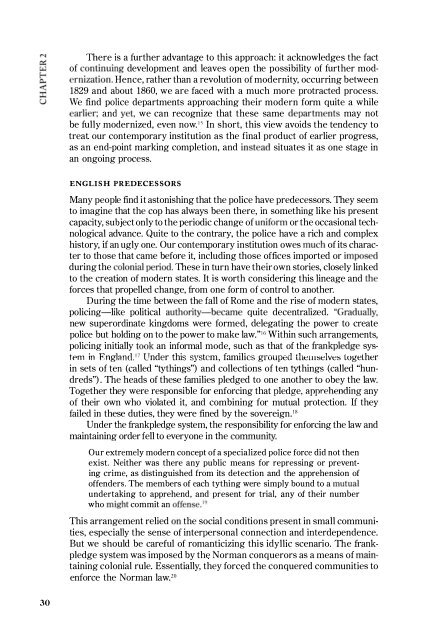Kristian Williams - Our Enemies in Blue - Police and Power in America
Kristian Williams - Our Enemies in Blue - Police and Power in America
Kristian Williams - Our Enemies in Blue - Police and Power in America
Create successful ePaper yourself
Turn your PDF publications into a flip-book with our unique Google optimized e-Paper software.
TIlere is a further advantage to this approach: it acknowledges the factof cont<strong>in</strong>u<strong>in</strong>g development <strong>and</strong> leaves open the possibility of further modernization.Hence, rather than a revolution of modernity, occurr<strong>in</strong>g between1829 <strong>and</strong> about 1860, we are faced with a much more protracted process.We f<strong>in</strong>d police departments approach<strong>in</strong>g their modern form quite a whileearlier; <strong>and</strong> yet, we can recognize that these same departments may notbe fully modernized, even now.ll In short, this view avoids the tendency totreat our contemporary <strong>in</strong>stitution as the f<strong>in</strong>al product of earlier progress,as an end-po<strong>in</strong>t mark<strong>in</strong>g completion, <strong>and</strong> <strong>in</strong>stead situates it as one stage <strong>in</strong>an ongo<strong>in</strong>g process.ENGLISH PREDECESSORSMany people f<strong>in</strong>d it astonish<strong>in</strong>g that the police have predecessors. They seemto imag<strong>in</strong>e that the cop has always been there, <strong>in</strong> someth<strong>in</strong>g like his presentcapacity, subject only to the periodic change of uniform or the occasional technologicaladvance. Quite to the contrary, the police have a rich <strong>and</strong> complexhistory, if an ugly one. <strong>Our</strong> contemporary <strong>in</strong>stitution owes much of its characterto those that came before it, <strong>in</strong>clud<strong>in</strong>g those offices imported or imposeddur<strong>in</strong>g the colonial period. These <strong>in</strong> turn have their own stories, closely l<strong>in</strong>kedto the creation of modern states. It is worth consider<strong>in</strong>g this l<strong>in</strong>eage <strong>and</strong> theforces that propelled change, from one form of control to another.Dur<strong>in</strong>g the time between the fall of Rome <strong>and</strong> the rise of modern states,polic<strong>in</strong>g-like political authority-became quite decentralized. "Gradually,new superord<strong>in</strong>ate k<strong>in</strong>gdoms were formed, delegat<strong>in</strong>g the power to createpolice but hold<strong>in</strong>g on to the power to make law.''J(, With<strong>in</strong> such arrangements,polic<strong>in</strong>g <strong>in</strong>itially took an <strong>in</strong>formal mode, such as that of the frankpledge systf'm<strong>in</strong> Engl<strong>and</strong>.'7 Under this systcm, families grouped theillselves together<strong>in</strong> sets of ten (called "tyth<strong>in</strong>gs") <strong>and</strong> collections of ten tyth<strong>in</strong>gs (called "hundreds"). The heads of these families pledged to one another to obey the law.Together they were responsible for enforc<strong>in</strong>g that pledge, apprehend<strong>in</strong>g anyof their own who violated it, <strong>and</strong> comb<strong>in</strong><strong>in</strong>g for mutual protection. If theyfailed <strong>in</strong> these duties, they were f<strong>in</strong>ed by the sovereign.'kUnder the frankpledge system, the responsibility for enforc<strong>in</strong>g the law <strong>and</strong>ma<strong>in</strong>ta<strong>in</strong><strong>in</strong>g order fell to everyone <strong>in</strong> the community.<strong>Our</strong> extremely modern concept of a specialized police force did not thenexist. Neither was there any public means for repress<strong>in</strong>g or prevent<strong>in</strong>gcrime, as dist<strong>in</strong>guished from its detection <strong>and</strong> the apprehension ofoffenders. The members of each tyth<strong>in</strong>g were simply bound to a mutualundertak<strong>in</strong>g to apprehend, <strong>and</strong> present for trial, any of their numberwho might commit an offense.]"This arrangement relied on the social conditions present <strong>in</strong> small communities,especially the sense of <strong>in</strong>terpersonal connection <strong>and</strong> <strong>in</strong>terdependence.But we should be careful of romanticiz<strong>in</strong>g this idyllic scenario. The frankpledgesystem was imposed by the Norman conquerors as a means of ma<strong>in</strong>ta<strong>in</strong><strong>in</strong>gcolonial rule. Essentially, they forced the conquered communities toenforce the Norman la w. 2030


